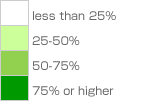The list summarizes "what successful JLPT examinees of each level think they can do in Japanese," based on self-evaluation survey results.
It is not a syllabus (question outline) of the JLPT, nor does it guarantee the Japanese-language proficiency of successful examinees. For language proficiency measured by the JLPT and question outline, please refer to "Summary of Linguistic Competence Required for Each Level."
The list can be used as a reference to help examinees and others get an idea of "what successful examinees of a particular level can do in Japanese."
※Please use "PDF for printout" when making hard copies, as the line height of tables varies by computer and character display size.
| N1 | N2 | N3 | N4 | N5 | |||
| 1 | I can express my opinion in a logical manner when I join in discussions and debates on topics I am concerned about. | ||||||
| 2 | I can ask questions and express my opinion about current topics covered by the media. | ||||||
| 3 | I can explain the background and cause of unpredictable occurrences (e.g. accidents, etc.). | ||||||
| 4 | I can use either polite or casual Japanese according to the situation and the person I am speaking with. | ||||||
| 5 | I can give a brief description of the story line of a movie I have seen or a book I have read recently. | ||||||
| 6 | I can express my agreement or disagreement of others' opinions in class discussions and tell its reason. | ||||||
| 7 | If I prepare in advance, I can give a presentation on a subject I specialize in or I know well. | ||||||
| 8 | I can talk with friends and colleagues about travel plans or party preparations, etc. | ||||||
| 9 | I can speak of my expectations and experiences at job interviews (e.g. working hours, work experience, etc.). | ||||||
| 10 | I can give walking directions and directions for public transportation to locations I know well. | ||||||
| 11 | If I prepare in advance, I can make a short speech in formal situations such as my own farewell party. | ||||||
| 12 | I can ask questions about things I want to buy and explain my wishes and conditions. | ||||||
| 13 | I can tell that I will be late or absent by telephone. | ||||||
| 14 | I can join in conversations on familiar everyday topics (e.g. hobbies, weekend plans, etc.). | ||||||
| 15 | I can ask when is convenient for the other person and decide a day and time to meet. | ||||||
| 16 | I can express feelings such as surprise and joy, and the reasons for them. | ||||||
| 17 | I can describe my room. | ||||||
| 18 | I can talk about my hobbies and interests. | ||||||
| 19 | I can engage in simple communication using phrases commonly used at stores, post offices, and stations (e.g. "How much is it?" "Can I have ○○?",etc.). | ||||||
| 20 | I can introduce myself and answer simple questions about myself. |
※Percentages of successful examinees of each level who think they "can do" an item are shown in four ranges. When estimating percentages, the responses of only "successful examinees near the passing line" were used. For details, please refer to "2.List preparation" at the beginning.

JLPT Can-do Self-Evaluation List

-
- *Outside Japan, the test may be held only in July or December in some cities. Click here for the test schedule in your city.
End of Text










